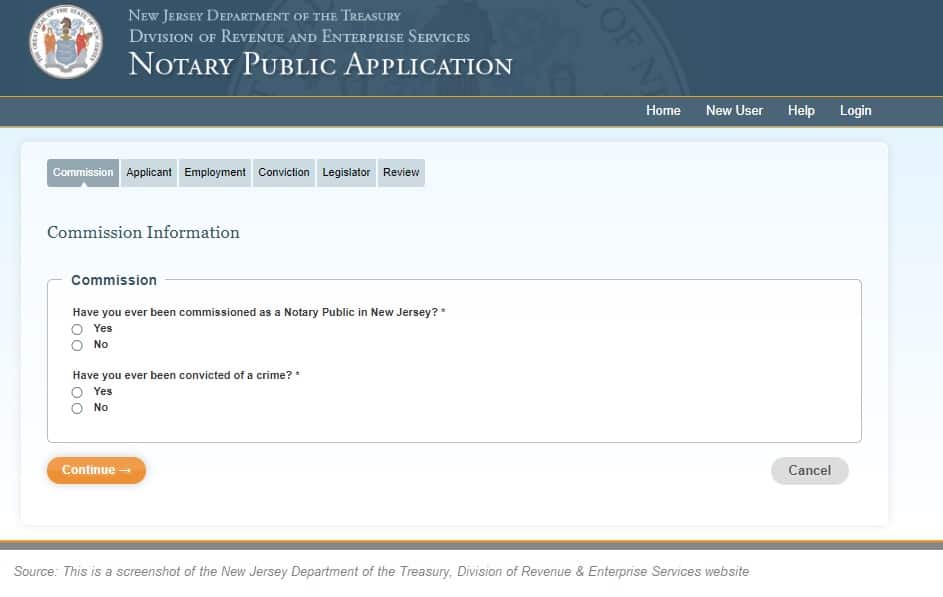(**) Disclosure: This post may contain affiliate links, meaning RealEstateCareerHQ.com will get a commission if you decide to make a purchase through the links, but at no additional cost to you.
To become a notary loan signing agent in New Jersey, an applicant must meet the state-eligibility requirement, submit the notary public application to a New Jersey County Clerk’s office, pay the filing fee, take an oath of office and purchase the notary seal and journal.
Although you could work on different types of documents, the loan signing business in the real estate market seems to be a lucrative niche.
So what does a loan signing agent do? When people are getting a mortgage to purchase a house, or they need to refinance their property, there will be loan documents involved. Your role as a notary loan signing agent is to walk through the set of loan documents with the borrower and witness them in signing the paperwork.
You would also need to verify the identity of the signers, place the notary stamp on the signed documents, then send them back to the signing services company or closing attorney.
But keep in mind that you should NOT be providing legal advice, and you cannot explain the terms of the loan documents to the borrower.
In this guide, you’ll learn the steps to become a notary signing agent in New Jersey, income updates, and FAQ about this profession.
But before we start, I want to give a brief disclaimer. This post is not intended as legal advice or state/federal notary public training. It is for general information only. Please check with your state to be sure that loan signing agents are utilized in the closing process. Always follow your state’s notary laws and best practices.
Would you like to learn how to make $75 to $200 per signing appointment? You must check out the Loan Signing System from Mark Wills. (**) This is one of the best training programs for loan signing agents. Many students have achieved remarkable business success after taking this program.
5 Steps to Become a Notary Signing Agent in New Jersey

Step 1: Meet the state-eligibility requirement
- At least 18 years of age
- Resident of New Jersey or an adjoining state who is employed in the State
- Have not convicted of a crime for an offense involving dishonesty, or a crime of the first or second degree.
Step 2: Submit a notary application to the New Jersey State Treasurer
The State Treasurer is the office that appoints the notary commission to applicants and maintains records of all notaries public in New Jersey.

You need to submit an online application at the Division of Revenue website. I like that the application process can be handled online. It is more convenient and saves the cumbersome mailing time while using less paper is also good for the environment.
Most of the questions on the application are pretty strict forward—for example, your name, business address, background info. Make sure the name on the application will be the same as when you are notarizing documents.
There is a $25 application fee. It can be paid by a credit/debit card or eCheck.
Step 3: Take an oath of office

After the New Jersey State Treasure approves your application, the Notary Public Unit will send a “Commission Certificate” and “Oath Qualification Certificate.”
It is better to review and make sure all the details are correct on the Notary Commission Certificate. (e.g., your name, county of residence, commission dates).
Then you must bring the certificates to your county clerk’s office within three months. In there, you will take an oath of office and pay the $15 filing fee. An oath of office is an affirmation that you agree to assume the duties of a notary public and that you will comply with the rules and laws.
Be sure to visit the clerk’s office in the county that you are applying to. Here is the list of county clerk’s offices in New Jersey.
Once all the above is completed, the country clerk will forward the completed “Oath Qualification Certificate” to the Notary Public Unit.
Step 4: Get a notary seal

Although the New Jersey notary law does not require to use an official stamp or steal to authenticate all notarial acts, having one helps you to include specific info in every document. This way, you won’t leave out any required details.
However, make sure its design comply with the regulatory rules. For example, the ink stamp needs to include the date on which your notary’s commission expires.
You may purchase the notary seal from office supplies store or at the county clerk’s office. Also, you must keep the notary seal in a locked and secured area, where only you have direct and exclusive control of it. (e.g. a locked drawer or cabinet.)
Step 5: Maintain a notary journal

As a notary signing agent in New Jersey, maintaining a good record of your notary acts is an essential part of good business practice. It could serve as proof that you have taken reasonable steps to identify the signer of a document.
It is better to have a permanently bounded journal with numbered pages. You may find it at stationery, office supply stores.
Below are the items you should record in the notary journal.
1) date and time of notary act,
Quote from New Jersey Notary Public Manual
2) type of act (i.e., acknowledgment),
3) title of document,
4) date document was signed,
5) signature; printed name and address of each signer, and if applicable, each witness, and
6) form of ID — e.g. identification document, personal knowledge, or credible witness.
Can you notarize an electronic signature in New Jersey?
Yes, you can notarize an electronic signature in New Jersey. e-Notarization is where you notarize an electronic document using an electronic signature and electronic seal.
Frankly, I prefer states that have the option for notaries to work digitally. This can bring you tremendous convenience to streamline your notary practice.
However, e-notarization is different from remote online notarization (Ron). E-notarization still requires you to meet the signer face-to-face, but not for RON.
Does NJ allow remote notarization?

Remote online notarization allows you not to be physically present with the signer. Instead, you would verify their the signer’s identity through video and audio conference.
At the time I’m writing the post, there are emergency rules imposed allows remote notarization in New Jersey.
However, this could be a temporary measure. Whether they would revert to in-person notarization afterward is unknown yet. Therefore, you should check with the State Treasurer.
Familiarize yourself with the rules and best practices of RON
As I am reading the NJ Notary Public Manual, they recommend to refer the best practices layout by the:
- National Notary Association (NNA),
- Mortgage Industry Standards Maintenance Organization (MISMO),
- National Association of Secretaries of State (NASS).
It is essential to read over the laws concerning remote notary acts. When performing a remote notarization, you need to ensure that the remote session is interactive and secure. Also, you must obtain satisfactory evidence to verify the signer’s identity.
Below are some of the necessary steps when performing a RON.
- Receive the document
- Review the document presented for completeness
- Ensure that the signer understands
- Use the appropriate certificate to match the type of act being executed
- Have the authenticated Principal sign the document using an electronic signature and password
- Sign the document as the notary public
- Keep a record
Career tips from Calvin Darville, an incredibly successful loan signing agent

” I would advise them to make sure they get training before entering the industry. I heard countless horror stories about the errors that incompetent notaries make.
I’ve even experienced some myself in my short span as a signing service owner. If a loan package isn’t executed correctly, it could literally blow a million-dollar deal. So my advice is definitely to get the proper training to limit errors.”
– Calvin Darville, President at Comfortable Closings
Here’s an interview I did with Calvin, where he shared his journey from being an Injured Football Player to a Successful Notary Loan Signing Agent. Be sure to check it out.
How much do notary loan signing agents make in New Jersey?

The average annual income of Loan Signing Agents in New Jersey is $50,410. The income typically ranges between $28,641 to $58,237. Top earning loan signing agents in New Jersey are making over $86,876.
As a notary, you could work on different documents, but the loan signing in the real estate market could be a lucrative niche.
Top 10 Highest Paying Cities for Loan Signing Agents in New Jersey
| City | Annual Salary |
|---|---|
| Passaic | $56,035 |
| Elizabeth | $51,423 |
| Newark | $50,477 |
| Camden | $49,081 |
| Paterson | $48,596 |
| Jersey City | $48,116 |
| Trenton | $47,083 |
| Clifton | $46,600 |
| Atlantic City | $45,631 |
| Vineland | $44,215 |
Source: ZipRecruiter (May 13, 2022)
Can you make over $10,000/month as a loan signing agent? Be sure to check out our notary earning guide. You’ll find a case study where a loan signing agent has built her business to such a successful figure.
Is there demand for notary loan signing agent in New Jersey?
I’m viewing the NJ Notaries Search database, and there are 148,081 active notaries. As long as people are obtaining mortgages or refinancing their homes, there would be a demand for loan signing agents.
All originated mortgages in New Jersey
| YEAR | All originated mortgages |
|---|---|
| 2017 | 169,196 |
| 2016 | 194,913 |
| 2015 | 171,685 |
| 2014 | 135,675 |
| 2013 | 226,181 |
| 2012 | 269,377 |
| 2011 | 210,948 |
| 2010 | 232,001 |
| 2009 | 274,489 |
| 2008 | 208,721 |
| 2007 | 317,276 |
Source: Consumer Financial Protection Bureau – Home Mortgage Disclosure Act (HMDA) (July 27, 2020)
Some states are “Attorney States,” which means only attorneys can coordinate the closing paperwork. Whereas, others are “Escrow States” where escrow companies would handle the mortgage closing.
According to the First American Title, either attorney or title companies can perform the closing in New Jersey. Here is a post that talks more about the differences escrow states and attorney states. And how would it impact your loan signing business?
If you want to succeed in the loan signing industry, you must check out this loan system training program. If you review the testimonials of his students, you’ll be amazed at how the notary career changes their life after they learned from Mark Wills. (**)
How much does it cost to become a notary loan signing agent in New Jersey?

It costs approximately $72 to become a notary loan signing agent in New Jersey.
Here’s a breakdown of the costs to start a notary signing business
| Notary Application | $25 |
| Oath of Office Filing fee | $15 |
| Notary Stamp | $17 |
| Journal | $15 |
There could be other expenses involved such as E&O, travel expenses, car maintenance, auto insurance, remote notary technology, laptop and other business supplies.
What education do you need to become a notary signing agent in New Jersey?

There is no education requirement to become a notary signing agent in New Jersey. But to achieve the best business practice in this profession, it is always good to equip yourself with notarial knowledge.
An excellent resource would be the New Jersey Notary Public Manual. It is a 16 pages guide that covers most of the topics you ought to know about the notary profession. Unlike a lawbook with lots of technical jargon, the content is presented in an easy-to-understand format.
Here are the things you would learn in the New Jersey Notary Public Manual:
- What Is A Notary Public?
- Who Appoints Notaries, And What Is The Notary’s Commission Period?
- What Are The Qualifications For The Office?
- How Does One Apply For A New Or Renewed Commission?
- Oaths and Affirmations
- Example of an oath administered by a Notary
- Example of an affirmation administered by a Notary
- Acknowledgments
- Requirements for Taking an Acknowledgment Proofs of Execution
- Jurats
- Requirements for a Jurat
- Protests for Non-Payment/Non-Acceptance
- Requirements for Executing a Protest
- Prohibitions And Liability What Is A Notary Prohibited From Doing?
- Are There Any Liabilities Associated With The Office?
- Notary Fees
- What Are The Fees For Notary Services?
- Information on Maintaining a Commission
- What Happens When A Notary Changes His/Her Name Or Address?
- How Can A Notary Obtain A Duplicate Commission?
- How Do You Authenticate A Notary Commission?
- Reference Sources
- Illustrations
- Certificate of Acknowledgment
- Jurat
- Certificate of Proof of Execution
- Remote Notarial Acts
You can find of its link in the reference section of the post.
Can a felon be a notary signing agent in New Jersey?
Having a conviction for a felony may impact the application to become a notary signing agent in New Jersey. The State Treasurer needs to make sure that you are a person with credibility, truthfulness, and integrity to fulfill the responsibilities of the position.
The State Treasurer may not appoint any person who has been convicted of a crime under the laws of any state or the United States, for an offense involving dishonesty, or a crime of the first or second degree.
Quote from New Jersey Notary Public Manual
But having a felony does not necessarily mean your application will automatically be declined. It depends on the severity and nature of the conviction. The New Jersey State Treasurer would review it on a case-by-case basis.
If you have a criminal conviction, when you are filling out the online application, you must upload:
- a certified copy of the judgment(s) of convictions;
- a certificate showing completion of a rehabilitative program(s).
The file format can be JPG, PDF, and PNG. But the file size cannot be more than 3 MB.
How long does it take to become a notary signing agent in New Jersey?

The processing time varies county by county. It’s better to contact the county clerk’s office for more info. But make sure to contact the one where you reside or maintain your principal place of business.
How to renew notary commission in New Jersey?
The notary commission term will last for five years. The renewal process can be done on the New Jersey Division of Revenue website.
To avoid an interrupted business period, begin the renewal process in advance. Don’t wait till your current notary commission is expired.
Can I notarize for a family member in New Jersey?

You must not notarize any documents where you have any financial or beneficial interest in the transaction. Therefore, notarizing a document for any family member could call into question, and such practice should be avoided.
The Office particularly states that a notary public is prohibited from notarizing his or her spouse’s signature. That’s because the spousal relationship may prevent the notary public from being impartial in the matter.
I have more questions about being a notary signing agent in New Jersey, where could I obtain more details?
You may contact the New Jersey Division of Revenue, Business Support Services/Notary Section
- P.O. Box 452, Trenton, NJ 08646
- (609) 292-0642
You can also reach the Division by filling out the online contact form.
If you are reading up to this point, I bet you must be interested in the notary signing profession. But why reinvent the wheel when there is a proven system that works? Many students had great success following the Loan Signing System (LSS) from Mark Wills. You may click here to check it out yourself. (**)
Disclaimer: The information in this post is for general information only, and not intend to provide any advice. They are subjected to change without any notice, and not guaranteed to be error-free. Some of the posts on this site may contain views and opinions from individual not related to JCHQ Publishing. They do not necessarily reflect our view or position.
(**) Affiliate Disclosure: Please note that some of the links above are affiliate links, and at no additional cost to you. Our company, JCHQ Publishing will earn a commission if you decide to make a purchase after clicking on the link. Please understand that we include them based on our experience or the research on these companies or products, and we recommend them because they are helpful and useful, not because of the small commissions we make if you decide to buy something through the links. Please do not spend any money on these products unless you feel you need them or that they will help you achieve your goals.
Reference:
- First American Title- Your Guide to Real Estate Customs by State (source)
- New Jersey Department of the Treasury, Division of Revenue & Enterprise Services (source)
- Salary.com – Notary Signing Agent Salary in New Jersey (source)
- ZipRecruiter – Loan Signing Agent Salary in New Jersey (source)
- Consumer Financial Protection Bureau – Home Mortgage Disclosure Act (HMDA) (source)
- New Jersey Notary Public Manual (source)

